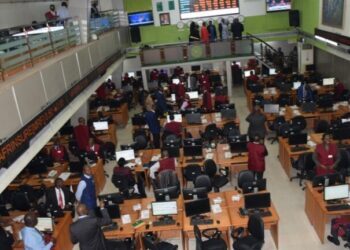The Apex umbrella body for the over 407 Ethnic Nationalities Youth Leaders in Nigeria, on Tuesday, accused the General Managing Director, GMD/CEO, of the Nigerian National Petroleum Corporation Limited, NNPCL, Mele Kyari, of sabotaging the fixing of indigenous refineries to the benefit of the subsidy cartel.
They called for the immediate sack of the General Managing Director, GMD/CEO, of the Nigerian National Petroleum Corporation Limited, NNPCL, Mele Kyari.
President General of the group, Comrade Terry Obeih, disclosed this in Abuja, at a press briefing, describing the situation as “unacceptable” and accused the Kyari-led NNPCL of sabotaging the smooth take-off of both the government-owned refinery and the Dangote group-owned refinery.
This stand is coming amid outcry by Devakumar Edwin, the Vice President of Oil and Gas at Dangote Industries Limited (DIL), that International Oil Companies, IOCs, were frustrating the Dangote Refinery’s commencement of fuel supply by selling crude oil at higher prices.
Edwin said the IOCs were intentionally obstructing the refinery’s efforts to purchase local crude by inflating premium prices above market rates, compelling the refinery to import crude from distant countries like the United States, leading to significantly higher costs.
Obeih said: “We met today, Tuesday, the 25th day of June, 2024 and reviewed the economic situation in the country as it affects the common masses.
“After a thorough analysis of the situation, it is our considered finding that the NNPCL is sabotaging the effort of the government towards making fuel affordable for Nigerians. There is a serious matter considering that Nigeria is operating a mono-economy, and as such whatever happens to fuel price, has a spiral effect.
“We want to start by recalling that earlier in March this year, the NNPCL MD, Mele Kyayi, promised Nigerians that within two weeks, the Port Harcourt refinery would begin production.
“The MD, who gave that assurance during his appearance before the Senate ad-hoc committee that was investigating the Nigerian Refineries’ Turn Around Maintenance (TAM) Projects, went as far as stating that more than 450,000 barrels of oil were stored at the Port Harcourt refinery.
“We did a mechanical completion of the refinery; that was what we said in December. We now have crude oil already stocked in the refinery. We are doing regulatory compliance tests that must happen in every refinery before you start it, and I assure you that this Port Harcourt refinery will start in the next two weeks. Completing the mechanical work means that you are done with the rehabilitation work, now you have to test to see how it works.
“Of course, we have also completed the mechanical work on the Warri refinery. It is also undergoing regulatory compliance; processes that we are doing with our regulator, and this will soon be completed and it will be ready. Lastly, all the crude lines supplying crude to Port Harcourt and Warri are very active and we have delivered over 450, 000 barrels of oil into Port Harcourt refinery. We are confident of the integrity of it. There may be security issues, but the government is responding to that.’
“We then find it so strange that three months after that vague promise, there is no sign that the refinery would begin operation any time soon. To make the matters worse, just a few days ago, Mr Devakumar Edwin, the Vice President of Oil and Gas at Dangote Industries Limited (DIL), accused International Oil Companies, IOCs, of frustrating the Dangote Refinery’s commencement of fuel supply by selling crude oil at higher prices.
“Edwin emphatically said that the IOCs were intentionally obstructing the refinery’s efforts to purchase local crude by inflating premium prices above market rates, compelling the refinery to import crude from distant countries like the United States, leading to significantly higher costs.
“These are not matters to be swept under the carpet; they are both interconnected and have to be addressed by the Federal Government. The indices point that a certain cabal in the NNPCL has vowed never to allow local refinery of petroleum products in Nigeria, all in a bid to remain as the sole importer of the commodity and exploit Nigerians.
“We declare today that enough is enough; Nigerians have suffered enough, whereas a few people are feeding fat. The liberalization of the petroleum industry was meant to be a blessing to the country but the reverse is the case, this is not to talk of the PIB which also talks of giving consideration to local refineries, but none of this is happening.”
The youth groups said since the NNPCL had shown lack of capacity to manage the industry, “the only honourable thing for Mela Kyari, the MD to do is to resign. However, should he fail to do so, we urge the President, Bola Ahmed Tinubu to sack him without further delay.
“Should Kyari fail to resign, the youths will not hesitate to mobilize for a national protest that will shut down the country if that is the only way to rescue Nigeria.
“It is clear that NNPCL under Kyari is bent on frustrating the President’s economic agenda, thereby worsening the suffering of the citizens and this is not good for the government. The NNPCL is clearly frustrating indigenous refining of fuel in order to continue importation, which is benefiting the subsidy cartel.
“The National Assembly led by Senator Godswill Akpabio should immediately within 7 days summon the courage to probe Mr Mele Kyari led NNPCL.
“We know that once we have our own local petroleum production refineries working at full capacity, where our local crude oil will be supplied directly to the aforementioned refineries either privately or government owned, the suffering of the masses will be alleviated. As we reaffirm our support for Mr President, it is our hope that he will take this bold action in the interest of the country.”











